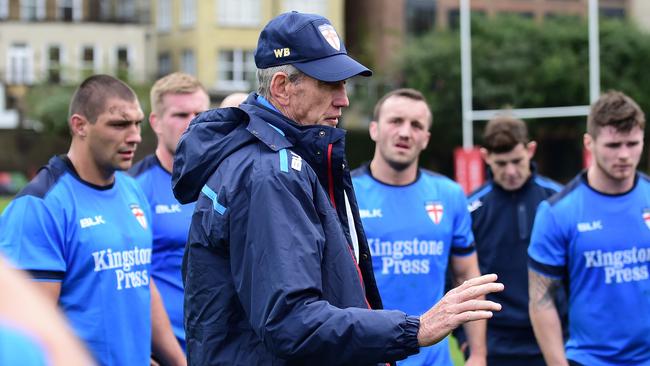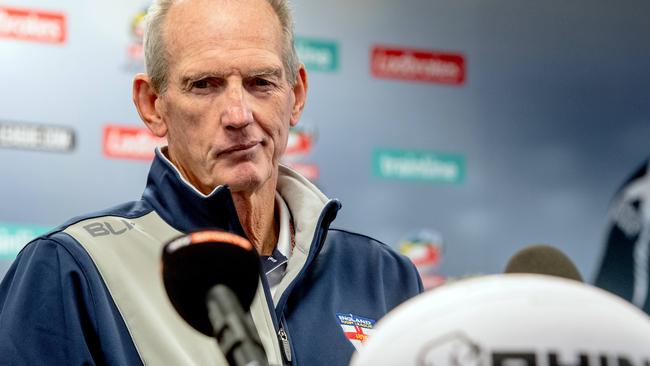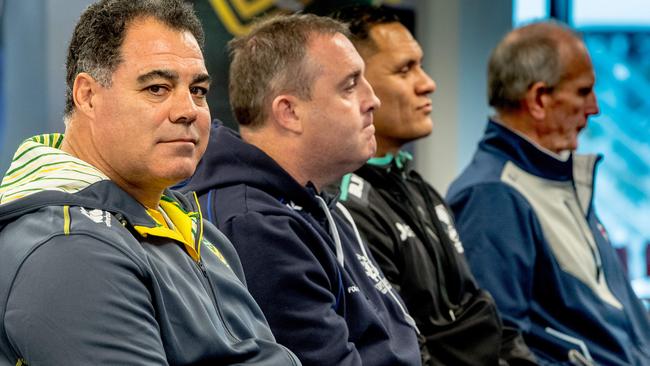Paul Kent on the real reason for England coach Wayne Bennett’s curt relationship with the media
WATCH as Wayne Bennett opens up on his relationship with Mal Meninga and the English media in an EXCLUSIVE interview with Daily Telegraph journalist Michael Carayannis.

NRL
Don't miss out on the headlines from NRL. Followed categories will be added to My News.
IN unfamiliar surrounds for the first time in his life it was no surprise Wayne Bennett, now coaching England, found a familiar battleground.
Bennett has been the Bennett of old since arriving in England, which is short and not-so-sweet, a man willing to play on only his terms.
It is a ploy he has used many times for different reasons with one common theme and few, if any, really know why.
Still, his curt responses during interviews sparked an angry response from English media. Here in Australia Phil Gould called his responses “rubbish”.
Recently, Australian coach Mal Meninga wrote an honest column declaring he and Bennett “haven’t had any sort of relationship for many years”.
Under fire, Bennett gave a startling interview on Friday, bristling about criticism that he does not promote the game, which will create headlines that will cross the world and justify the very point he is making.
Bennett, who recently separated from his wife, gave Fox Sports an extended interview to be aired throughout today and played in full tonight. He remained respectful towards Meninga.

“I’ve got a good relationship with Mal,” he said. “I spent some time with him yesterday.”
Pressed on what they spoke about after Meninga’s recent column, he replied: “We had a conversation yesterday ... I’ll just leave it at that.”
His love for the game, the desire of others to see him promote it, forced him into a detailed response.
“I’m over here, five weeks away from my home,” he said. “Everybody that’s important to me are not here with me. I don’t know how they work it out I’m not promoting the game. I don’t know how they work it out I’m not giving something back to the game.
“I mean, the critics are sitting home in their lounge rooms in Australia drinking their wine and I’m out here in the coal face getting the job done.
“It is pretty ludicrous when you think about it but, unfortunately, you all buy into it and none of you are free and independent thinkers enough to say ‘well hang on, this guy, every time he takes a training run he’s out there promoting the game’.”
So that’s enough? the Telegraph’s Michael Carayannis asked.
“It’s not enough, but the point I’m making is, don’t accuse me of not promoting the game, OK?”
When English commentators criticised Bennett’s interview demeanour they pointed out his appointment as national coach was partly forced by the game’s state in England.
English rugby league is teetering in financial crisis and struggling for survival.
Bennett was regarded as a two-pronged appointment: a first-class coach capable of steering England to a Four Nations win and success at next year’s World Cup but, also, a coach with the standing to cut through the crowded coverage and create space for rugby league in the English
media.

Instead of helping sell the game much of the comment has been on his unwillingness to co-operate.
“I’ve spent my lifetime with my image, the way I’ve coached teams, the things I have done in the game, everything has been done about promoting the game,” he said.
“I don’t want to be a headline. I don’t want to be a front page, I don’t want to be a back page.
“It doesn’t interest me at all that part of it What interests me is how the team plays, how you respect the team, how you admire what they do as a fan. You don’t have to be a Broncos
fan or a Queensland fan or whatever, and you walk away and you think I’ve just seen a great game of rugby league.
“Now every time we do that ... we promote the game better than anything else we do.”
It is hard to argue and he is mostly right.
What Bennett fails to realise is that if Donald Trump can be elected US President on a campaign of simple sound bites on complex issues — convincing a dull-witted nation that it is wisdom — the battle for “free and independent thinkers” might already be lost.
Bennett has not changed, just the world has.
English rugby league is fighting for survival and needs a champion to lead them, not drive people away, and the way they play certainly isn’t doing it for them.
If there is an irony, it is that Bennett’s truculence at interviews and his simmering private war with Meninga has created exactly the kind of interest Bennett claims to care little about, giving life to what has been a mediocre tournament.
And Bennett would know that.
Some say that points to a master media manipulator, a coach who knows the media better than we know ourselves and plays us at every chance.
That is incorrect.
Bennett resorts to such behaviour always at a time of strong emotion in his life.
The common theme is vulnerability, which has an uncommon depth.
Nobody ever realises that about Bennett. A failed marriage, a war with a once star pupil, new relationships with hardened media ...
His silence is a man protecting those vulnerabilities, shutting down because, he knows, they could be coming from anywhere.
Originally published as Paul Kent on the real reason for England coach Wayne Bennett’s curt relationship with the media



